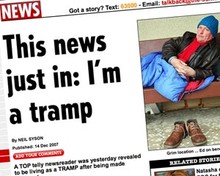
After being 'invisible', the former ITN and CNBC newsreader now finds it uncomfortable addressing a public crowd, he apologises to those who have turned out to the event promoting his book 'From Headlines to Hard Times'.
Mitchell, who at the top of his game earned £100,000 a year, became homeless in 2007, in crippling debt and suffering from alcohol addiction.
Journalism was part of the root of his troubles - but also a way out, Mitchell says.
Media culture
Having started out as journalist at Reuters on Fleet Street in 1974, drinking was an essential part of the job, he says.
"[There was] the image of the heavy drinking journalist, the best stories discovered down the pub. The best contacts I ever made were with alcohol and alcohol-related things. It was just what journalists did," he says.
"It's certainly possible to be a very successful journalist and be tee-total. One doesn't cause the other. But there were very few journalists that got on without drinking."
During 30 years in the business, Mitchell spent 10 with the BBC, three at ITN and later joined CNBC – a job, he admits, that was extremely demanding.
"I was using alcohol to get confidence to go on camera and to take down the adrenaline afterwards. I was using alcohol to get me going at 2am," he says, adding that he'd often drink a quarter of a bottle of spirits on his way to do a live show.
'Editor in my head'
Mitchell's problems with alcohol and debt are well-documented since he came under the media's spotlight after being discovered sleeping rough on Brighton seafront in December 2007.
"I was very much a amateur at this business of sleeping rough. I remember the first night It rained and thought, 'what do you do, where do you go?'," he describes.
Having been found by an employee at the Brighton Argus, who worked part-time with a Christian homeless charity, Mitchell was interviewed by the paper - a stepping stone out of his crisis, he says.
"It was a very slow news time. I also knew what made a good sound bite and even though I was a piss artist tramp, I knew which quotes they would use," he says.
"It was embarrassing, but it got me out of a mess. It being a very inward-looking business, all the nationals got onto the story. Quite often they would hand me cash which I would spend on alcohol.
"In a few days I'd been transformed from an invisible tramp, who had no hope, to someone who was having a documentary made about him."
The documentary in question, 'Ed Mitchell: What Happened Next' was an interesting experience for Mitchell: used to being in front of the camera as a journalist, his knowledge of production and the industry was inescapable.
He refers to an ever-present editor in his head, telling him not to mention alcohol during his first media interviews and to perform in certain ways for the documentary cameras.
"I was aware that if I was seen on that park bench because I was a drunk, it [the original story] wouldn't have gotten the legs that it did. Because I was a journalist I knew what they wanted me to do and I knew that a successful story would get me out of it [his problems]," he says.
"I never drank in public but I knew it was part of the image of a street drinker [for the documentary].
"You could call it necessary prostitution. It's about images. A journalist always approaches a story with the story written in his mind."
A return to journalism?
Having experienced life in front of the lens from both angles, Mitchell, who has not had alcohol in 16 months, is not ruling out a return to journalism.
Despite acknowledging the role of the industry in feeding his addiction, the culture has changed, he says.
With a roof now over his head, a proposal for a TV series on alcoholism and its treatment is in the works, Mitchell says.
"I'm almost condemned for life to be a recovering alcoholic. You'll always be asked about homeless issues and alcohol," he says.
"I do want to give back and lend my name to help people who are in my position."
Free daily newsletter
If you like our news and feature articles, you can sign up to receive our free daily (Mon-Fri) email newsletter (mobile friendly).
Related articles
- Expressen TV continues to grow as it gears up to work on new online business channel
- Why CBC News produced its first investigative podcast
- 'We don't want to short-change our audience': Al Jazeera's take on Facebook Live
- The Washington Post sees opportunities for 'slow TV' on Facebook Live
- WATCH: So you want to be a radio reporter?









